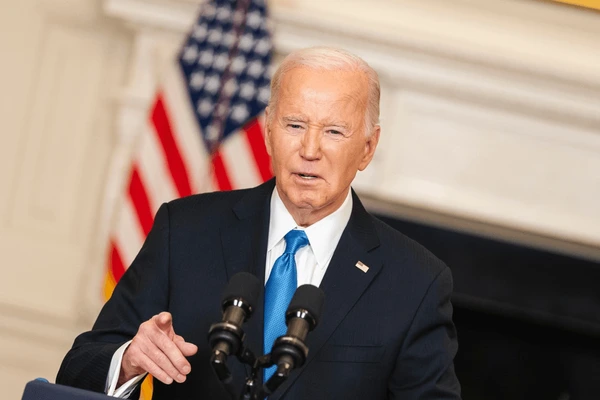In a stunning turn of events, President Joe Biden has announced his withdrawal from the 2024 presidential race, sending shockwaves through the political landscape.
This unexpected decision has left the Democratic Party scrambling for a new frontrunner and has dramatically altered the trajectory of the upcoming election.
The Announcement
President Biden made the announcement during a press conference at the White House, catching many off guard.
He cited ongoing health concerns as the primary reason for his decision, stating that the rigors of another presidential campaign and potentially four more years in office would be too demanding.
This decision comes amid growing concerns about Biden’s age and fitness for office, as reported by Reuters.
Key Points from Biden’s Statement:
- Acknowledgment of the challenging nature of the presidency
- Gratitude to supporters and staff
- Commitment to ensuring a smooth transition for the Democratic Party
Implications for the Democratic Party
Biden’s withdrawal has created a power vacuum within the Democratic Party, leaving several key questions unanswered:
Who Will Step Up?
With Biden out of the race, attention now turns to potential candidates who might step in to fill the void. Several names have been floated, including:
- Vice President Kamala Harris
- Transportation Secretary Pete Buttigieg
- Senator Elizabeth Warren
- Governor Gavin Newsom
Each of these potential candidates brings their own strengths and weaknesses to the table, and the coming weeks will likely see intense jockeying for position within the party. The Hill provides an in-depth look at potential Democratic candidates who might emerge in the wake of Biden’s withdrawal.
Impact on Party Unity
Biden’s decision also raises concerns about party unity. As a moderate, Biden was seen as a unifying figure who could bridge the gap between progressive and centrist Democrats. His absence from the ticket may exacerbate existing tensions within the party.
Republican Response
The Republican Party has been quick to capitalize on the news, with several prominent figures issuing statements:
- Former President Donald Trump called it a “victory for America”
- Florida Governor Ron DeSantis described it as “an opportunity for real change”
- Senator Mitch McConnell emphasized the need for “steady leadership” in uncertain times
What This Means for the 2024 Election
Biden’s withdrawal has significantly altered the landscape of the 2024 election. Here are some key considerations:
Voter Sentiment
Recent polls had shown Biden’s approval ratings hovering around 45%, with concerns about his age and stamina frequently cited by voters.
His withdrawal may alleviate some of these concerns for the Democratic Party, but it also introduces new uncertainties. Gallup’s presidential approval center provides a comprehensive look at historical approval ratings for context.
Policy Implications
Biden’s successor as the Democratic nominee may take a different stance on key issues such as:
- Healthcare reform
- Climate change policy
- Foreign relations, particularly with China and Russia
The Brookings Institution offers an analysis of Biden’s key policy initiatives, which may help in understanding potential shifts in Democratic policy priorities.
Electoral Map
Biden’s absence from the ticket could potentially reshape the electoral map. States that were considered lean-Democratic under Biden may now be up for grabs, depending on who emerges as the new nominee. The Cook Political Report provides expert analysis on the evolving electoral landscape.
Looking Ahead
As the dust settles on this major political development, several key events and dates will shape the path forward:
- Democratic National Committee emergency meeting (date TBA)
- Potential reshuffling of primary debates
- August 2024: Democratic National Convention
The Bottom Line on Biden’s Withdrawal
President Biden’s withdrawal from the 2024 presidential race marks a seismic shift in American politics.
As the Democratic Party regroups and new candidates emerge, the coming months promise to be a period of intense political activity and speculation.



